
Priorities and Progress
Eyes On Learning works to ensure that all Arizona children — wherever they live, whatever their economic status — have access to the services they need for their best vision health. Partners in Eyes On Learning have identified several strategic priorities and goals to focus our collective efforts and maximize our impact.
-
Quality and Access
GOALS
- More opportunities for children to receive high-quality vision screenings in schools, community settings, and from healthcare providers in all areas of Arizona.
- More children who fail vision screenings are referred for and receive follow-up exams and treatment from an eye doctor.
- More vision care options for low-income families and children covered by AHCCCS/Medicaid.
-
Continuity Of Care
GOALS
- More families are notified of children’s vision care referrals, appointments, and needs in a timely and efficient way.
- Better coordination among system partners for more efficient, accurate referrals and tracking of follow-up care, and data collection and reporting.
-
Awareness
GOALS
- More understanding of the importance of children’s vision health among Arizona families, communities, partners, and policymakers.
- More families know when, where, and how to access vision care for their children.
- More families understand their insurance benefits and payment options for children’s vision care.
PROGRESS HIGHLIGHTS
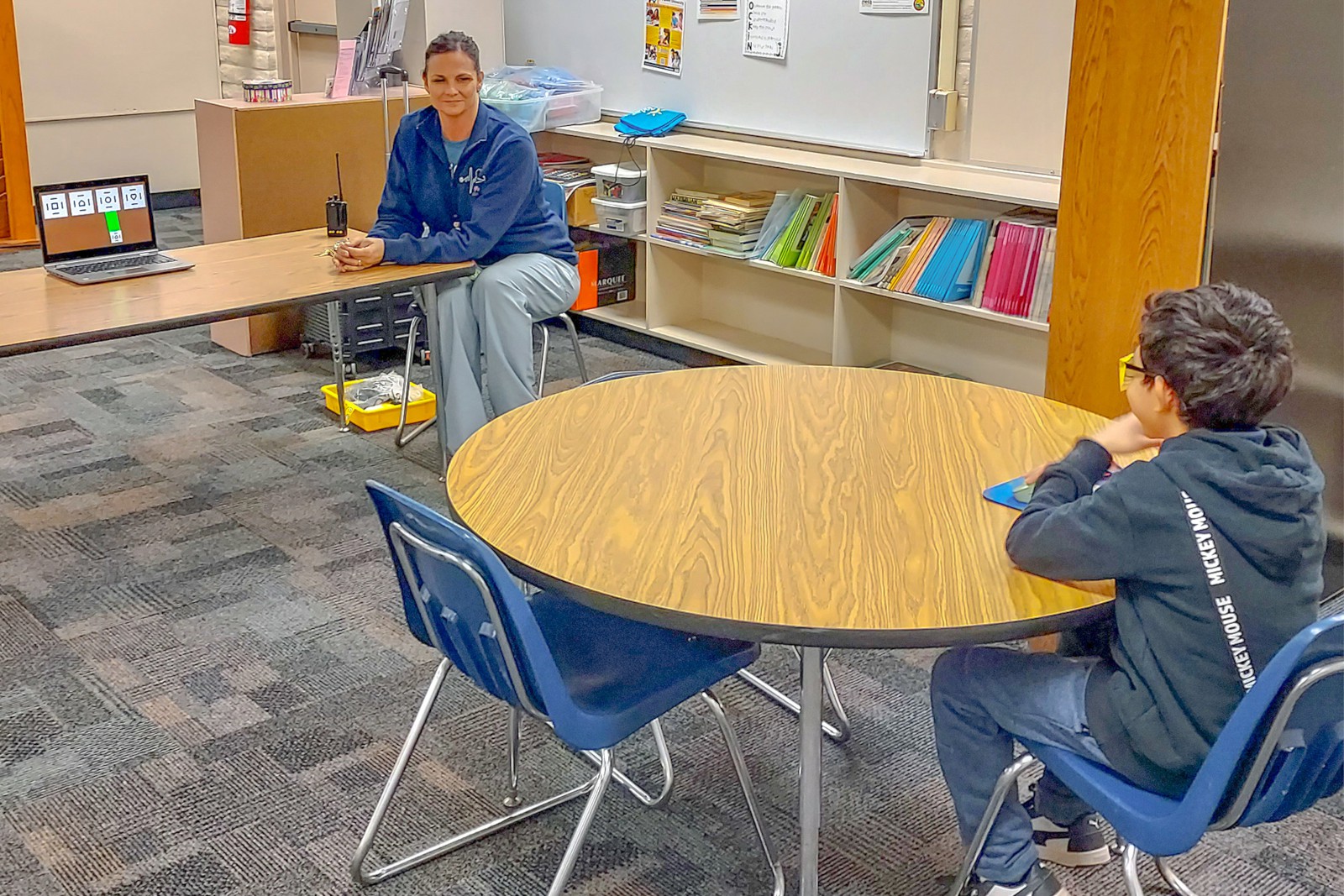
Policy win: Vision screening in Arizona schools
Eyes On Learning developed recommendations that contributed to the passage of new legislation (ARS §36-899.10) in 2019 requiring all Arizona public and charter schools to conduct regular vision screenings for young children. While some schools had offered vision screenings in the past, the new law provides rules and guidelines for all schools to conduct vision screenings at school entry (pre-K or kindergarten), in third grade, and again in seventh grade. Schools may also choose to screen children in other or all grades. Eyes On Learning was also instrumental in bringing philanthropic investments and federal funding to successfully implement the new policy, which began in the 2024-2025 school year. Approximately 500,000 students will be screened for potential vision problems every year.
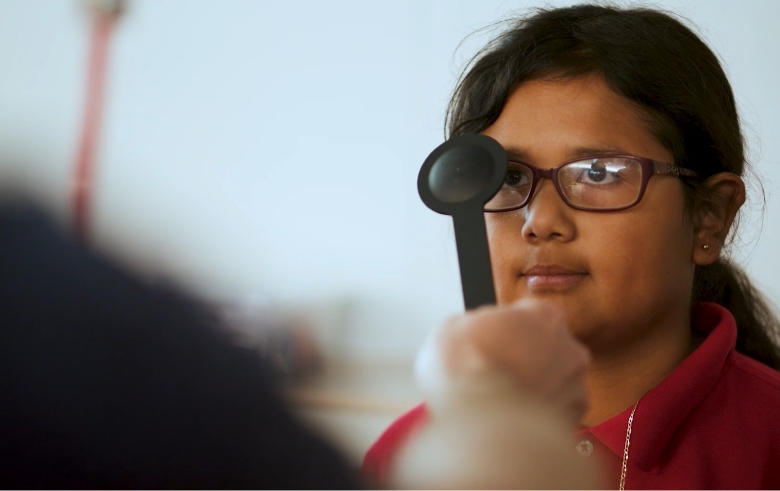
New system for training and certification of vision screeners
To facilitate implementation of the new vision screening law, Eyes On Learning collaborated with the Arizona Department of Health Services to transform the vision screener certification process. Vision screenings are typically conducted by a school nurse, but any school representative, community partner, or volunteer can now be trained and certified via a new online program offered by ADHS at no cost to schools. More than 500 school nurses were certified in 2024-25, and certification is valid for four years.
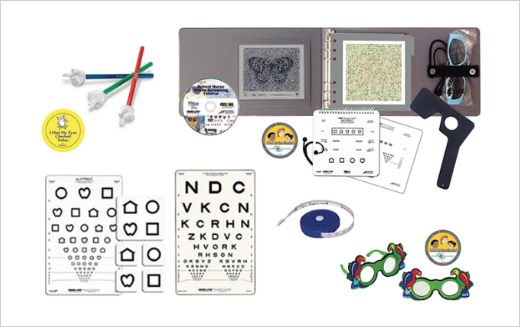
Tools for schools
The Arizona Vision Screening Kit was developed in 2019 through a partnership with the Arizona Department of Health Services (ADHS) and the School Health company to provide schools with the resources they need to implement the new school vision screening law. ADHS purchased an initial number of kits to distribute to public schools, and Vitalyst Health Foundation led efforts among additional philanthropic partners, including Virginia G Piper Charitable Trust, the Arizona Community Foundation, and BHHS Legacy Foundation, to procure more. Each kit contains all appropriate eye charts, occluders, measuring tapes, and hand pointers so schools can conduct vision screening for children across grade levels, as detailed in the law. Kits have been distributed, at no cost, to over 600 Arizona public schools.
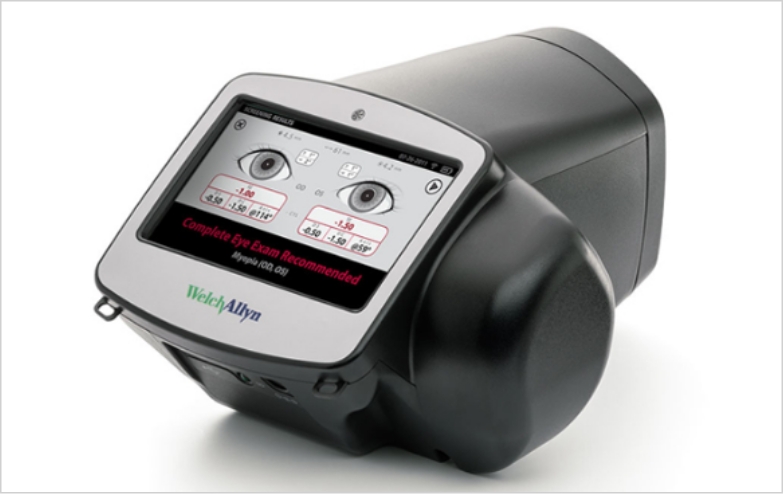
Photoscreener grants expand vision screening for young children
A 2018 statewide survey of community health centers, conducted in partnership with Arizona State University, showed large gaps in the availability of screening services for children under age 6. Effective, age-appropriate vision screening for young children requires expensive, specialized equipment. To address this need, Eyes On Learning partnered with Vitalyst Health Foundation and Virginia G. Piper Charitable Trust, who together provided more than $500,000 in funding, to grant 60 state-of-the-art photoscreening instruments directly to public and nonprofit healthcare providers, schools, and community programs to provide high-quality vision screening for young children. To signify the impact of this statewide program, the grant of three devices to Neighborhood Outreach Access to Health (NOAH) has resulted in 1,500 more young children receiving vision screening annually.
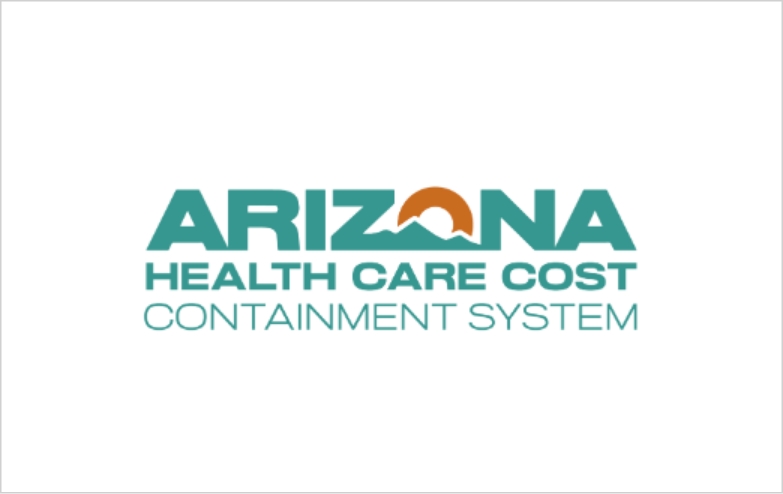
Policy update clarifies AHCCCS vision coverage
Eyes On Learning discovered that many vision service providers in Arizona mistakenly thought that children covered by AHCCCS could not get another pair of glasses if theirs were lost or broken. EOL then worked with AHCCCS to add new language to its Medical Policy Manual in 2022 to eliminate this confusion and help make providers, schools, and families aware that “replacement and repair of eyeglasses for members under the age of 21 years are covered, without restrictions, by AHCCCS.”
PROGRESS HIGHLIGHTS
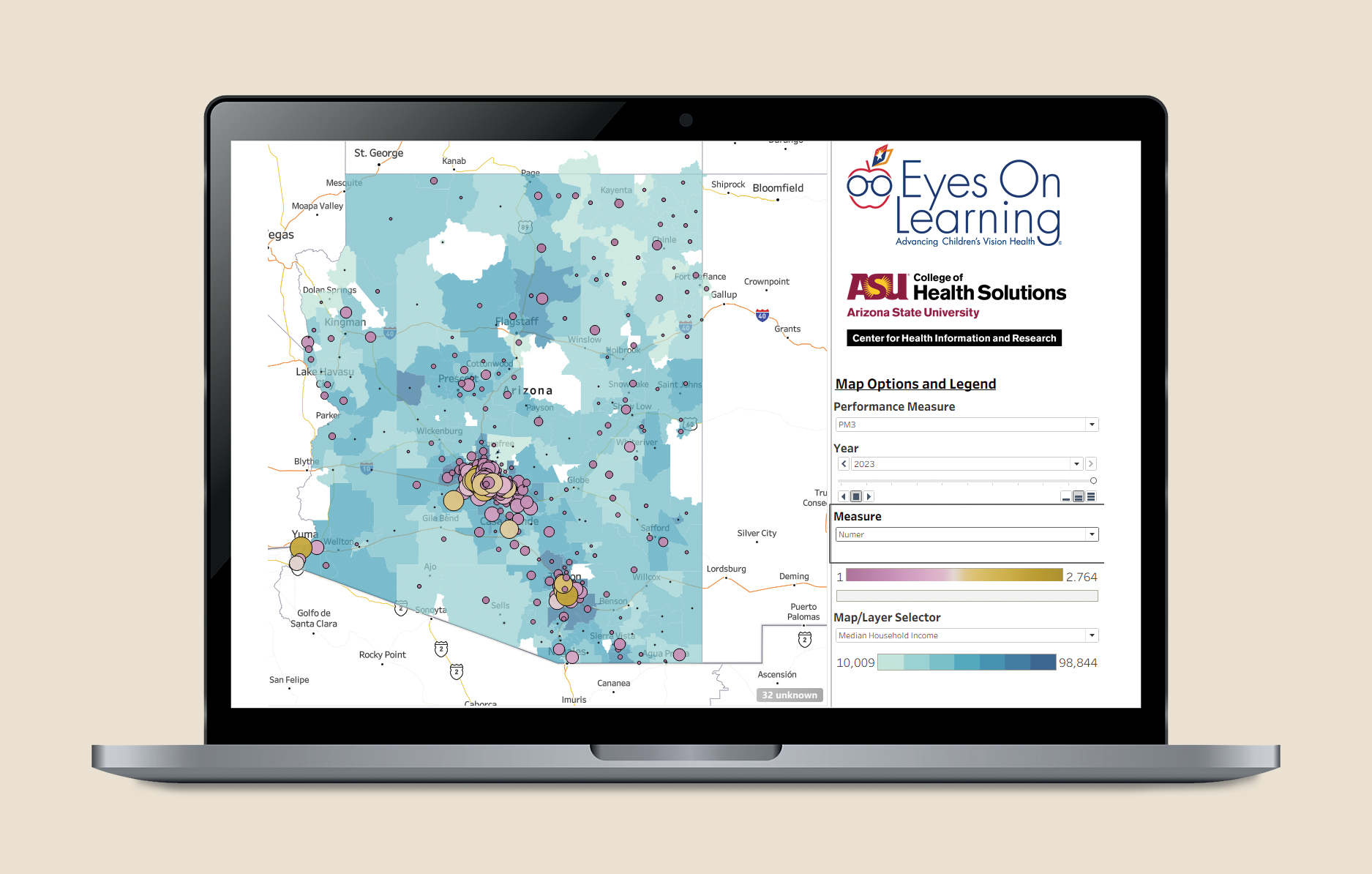
Eyes On Learning Data Dashboard
Data has been a cornerstone of the work of Eyes On Learning since its inception, but until recently, Arizona had no centralized data system for monitoring key indicators of children’s vision care. In 2020, after years of productive, cross-sector collaboration, Eyes On Learning partnered with Arizona State University’s Center for Health Information & Research (CHiR) to launch the Eyes On Learning Dashboard, an interactive data tool that tracks six performance measures — including the rate of children’s vision screening, eye exams, and treatment — using aggregate AHCCCS (Medicaid) claims data. (About half of all children in Arizona are covered by AHCCCS.) Data is available by geography, gender, age, health plan, and other relevant factors. This shared data system is an invaluable tool for identifying gaps in services and informing strategies and priorities for the future.
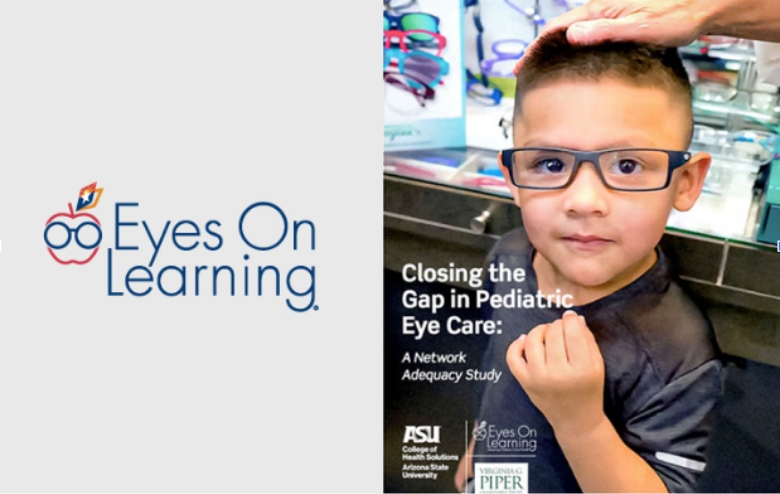
Closing the Gap in Pediatric Eye Care
Eyes On Learning partnered with ASU’s College of Health Solutions and Virginia G. Piper Charitable Trust to conduct a network adequacy study in 2022 to determine how and where eye care providers offer services for children in Arizona. The resulting report highlighted several stark realities, including that 74% of eye care practices do not serve children covered by AHCCCS/Medicare, and four rural counties have only one or no providers that serve children.
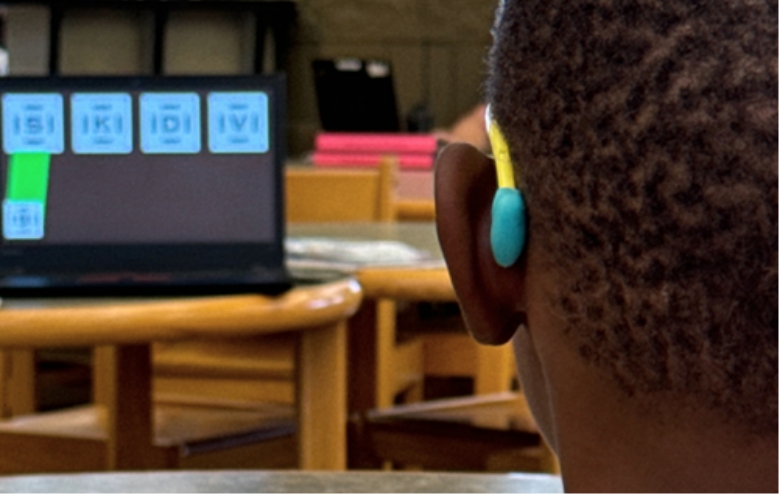
Tech innovation to streamline vision screening in schools
With generous funding from several philanthropic partners, Eyes On Learning launched a two-year pilot program in 2024 to bring EyeSpy 20/20, a web-based vision screening program, to almost 400 Arizona schools. Developed by VisionQuest 20/20, an Arizona-based nonprofit, EyeSpy 20/20 uses game design elements to conduct accurate, validated vision screenings of children’s distance and near visual acuity, depth perception, and color vision. Screenings can be conducted on laptops, smartphones, or tablets, eliminating the need for expensive screening equipment. EyeSpy 20/20 also includes secure data management and communication between school health staff, families, and eye care doctors to facilitate referrals for follow-up vision care for children whose screening indicates a potential problem. The long-term goal of the pilot is to offer EyeSpy 20/20 to all schools in Arizona at no cost.
PROGRESS HIGHLIGHTS
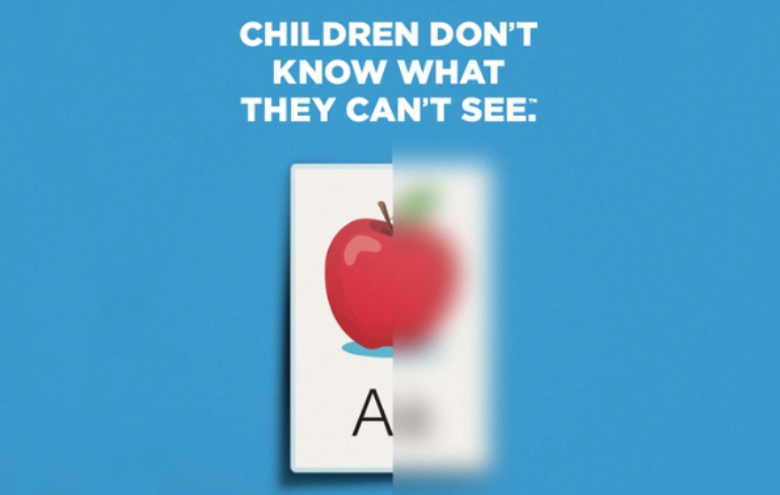
Public awareness campaign
In 2018, Eyes On Learning launched a public awareness campaign, “Children Don’t Know What They Can’t See,” to help inform Arizona families about the importance of children’s vision health and its link to learning, social development, and overall health. Campaign messaging and materials encourage parents to seek vision care for their children along “the path to healthy vision,” from regular screening for all children to eye exams and follow-up treatment, if needed. In 2022, Eyes On Learning amplified this messaging with a bilingual communications campaign targeting low-income families with young children. The campaign featured five videos, available in both English and Spanish, focused on a specific call to action: “Talk with your child’s doctor about vision screening.” Distributed through digital and social media over 60 days, the campaign yielded over 1.1 million impressions and a 200% increase in visits to the Eyes On Learning website.
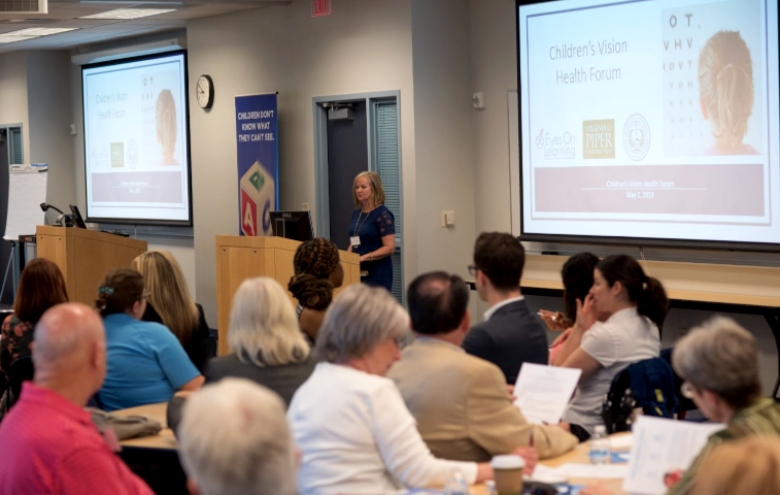
Children’s vision forums
To build collaboration and alignment on strategic priorities, Eyes On Learning convened cross-sector leaders and partners from across Arizona for the Children’s Vision Forum. With support from Virginia G. Piper Charitable Trust and Midwestern University, the 2019 forum explored innovative approaches to help move vulnerable children from vision screening to vision care. The forum also led to the implementation of a public health awareness campaign to highlight the importance of children’s vision care; collaborative efforts to build a centralized vision health data collection system; and strategies to reach more children from low-income families with mobile eye exams. The 2023 forum, supported by Piper Trust and Vitalyst Health Foundation, added focus on expanding the pediatric eye care and Medicaid provider workforce in Arizona and technology-based solutions, such as EyeSpy 20/20, to connect more Arizona children to vision screening and follow-up care.
Quality and Access
GOALS
- More opportunities for children to receive high-quality vision screenings in schools, community settings, and from healthcare providers in all areas of Arizona.
- More children who fail vision screenings are referred for and receive follow-up exams and treatment from an eye doctor.
- More vision care options for low-income families and children covered by AHCCCS/Medicaid.
PROGRESS HIGHLIGHTS

Policy win: Vision screening in Arizona schools
Eyes On Learning developed recommendations that contributed to the passage of new legislation (ARS §36-899.10) in 2019 requiring all Arizona public and charter schools to conduct regular vision screenings for young children. While some schools had offered vision screenings in the past, the new law provides rules and guidelines for all schools to conduct vision screenings at school entry (pre-K or kindergarten), in third grade, and again in seventh grade. Schools may also choose to screen children in other or all grades. Eyes On Learning was also instrumental in bringing philanthropic investments and federal funding to successfully implement the new policy, which began in the 2024-2025 school year. Approximately 500,000 students will be screened for potential vision problems every year.

New system for training and certification of vision screeners
To facilitate implementation of the new vision screening law, Eyes On Learning collaborated with the Arizona Department of Health Services to transform the vision screener certification process. Vision screenings are typically conducted by a school nurse, but any school representative, community partner, or volunteer can now be trained and certified via a new online program offered by ADHS at no cost to schools. More than 500 school nurses were certified in 2024-25, and certification is valid for four years.

Tools for schools
The Arizona Vision Screening Kit was developed in 2019 through a partnership with the Arizona Department of Health Services (ADHS) and the School Health company to provide schools with the resources they need to implement the new school vision screening law. ADHS purchased an initial number of kits to distribute to public schools, and Vitalyst Health Foundation led efforts among additional philanthropic partners, including Virginia G Piper Charitable Trust, the Arizona Community Foundation, and BHHS Legacy Foundation, to procure more. Each kit contains all appropriate eye charts, occluders, measuring tapes, and hand pointers so schools can conduct vision screening for children across grade levels, as detailed in the law. Kits have been distributed, at no cost, to over 600 Arizona public schools.

Photoscreener grants expand vision screening for young children
A 2018 statewide survey of community health centers, conducted in partnership with Arizona State University, showed large gaps in the availability of screening services for children under age 6. Effective, age-appropriate vision screening for young children requires expensive, specialized equipment. To address this need, Eyes On Learning partnered with Vitalyst Health Foundation and Virginia G. Piper Charitable Trust, who together provided more than $500,000 in funding, to grant 60 state-of-the-art photoscreening instruments directly to public and nonprofit healthcare providers, schools, and community programs to provide high-quality vision screening for young children. To signify the impact of this statewide program, the grant of three devices to Neighborhood Outreach Access to Health (NOAH) has resulted in 1,500 more young children receiving vision screening annually.

Policy update clarifies AHCCCS vision coverage
Eyes On Learning discovered that many vision service providers in Arizona mistakenly thought that children covered by AHCCCS could not get another pair of glasses if theirs were lost or broken. EOL then worked with AHCCCS to add new language to its Medical Policy Manual in 2022 to eliminate this confusion and help make providers, schools, and families aware that “replacement and repair of eyeglasses for members under the age of 21 years are covered, without restrictions, by AHCCCS.”
Continuity Of Care
GOALS
- More families are notified of children’s vision care referrals, appointments, and needs in a timely and efficient way.
- Better coordination among system partners for more efficient, accurate referrals and tracking of follow-up care, and data collection and reporting.
PROGRESS HIGHLIGHTS

Eyes On Learning Data Dashboard
Data has been a cornerstone of the work of Eyes On Learning since its inception, but until recently, Arizona had no centralized data system for monitoring key indicators of children’s vision care. In 2020, after years of productive, cross-sector collaboration, Eyes On Learning partnered with Arizona State University’s Center for Health Information & Research (CHiR) to launch the Eyes On Learning Dashboard, an interactive data tool that tracks six performance measures — including the rate of children’s vision screening, eye exams, and treatment — using aggregate AHCCCS (Medicaid) claims data. (About half of all children in Arizona are covered by AHCCCS.) Data is available by geography, gender, age, health plan, and other relevant factors. This shared data system is an invaluable tool for identifying gaps in services and informing strategies and priorities for the future.

Closing the Gap in Pediatric Eye Care
Eyes On Learning partnered with ASU’s College of Health Solutions and Virginia G. Piper Charitable Trust to conduct a network adequacy study in 2022 to determine how and where eye care providers offer services for children in Arizona. The resulting report highlighted several stark realities, including that 74% of eye care practices do not serve children covered by AHCCCS/Medicare, and four rural counties have only one or no providers that serve children.

Tech innovation to streamline vision screening in schools
With generous funding from several philanthropic partners, Eyes On Learning launched a two-year pilot program in 2024 to bring EyeSpy 20/20, a web-based vision screening program, to almost 400 Arizona schools. Developed by VisionQuest 20/20, an Arizona-based nonprofit, EyeSpy 20/20 uses game design elements to conduct accurate, validated vision screenings of children’s distance and near visual acuity, depth perception, and color vision. Screenings can be conducted on laptops, smartphones, or tablets, eliminating the need for expensive screening equipment. EyeSpy 20/20 also includes secure data management and communication between school health staff, families, and eye care doctors to facilitate referrals for follow-up vision care for children whose screening indicates a potential problem. The long-term goal of the pilot is to offer EyeSpy 20/20 to all schools in Arizona at no cost.
Awareness
GOALS
- More understanding of the importance of children’s vision health among Arizona families, communities, partners, and policymakers.
- More families know when, where, and how to access vision care for their children.
- More families understand their insurance benefits and payment options for children’s vision care.
PROGRESS HIGHLIGHTS

Public awareness campaign
In 2018, Eyes On Learning launched a public awareness campaign, “Children Don’t Know What They Can’t See,” to help inform Arizona families about the importance of children’s vision health and its link to learning, social development, and overall health. Campaign messaging and materials encourage parents to seek vision care for their children along “the path to healthy vision,” from regular screening for all children to eye exams and follow-up treatment, if needed. In 2022, Eyes On Learning amplified this messaging with a bilingual communications campaign targeting low-income families with young children. The campaign featured five videos, available in both English and Spanish, focused on a specific call to action: “Talk with your child’s doctor about vision screening.” Distributed through digital and social media over 60 days, the campaign yielded over 1.1 million impressions and a 200% increase in visits to the Eyes On Learning website.

Children’s vision forums
To build collaboration and alignment on strategic priorities, Eyes On Learning convened cross-sector leaders and partners from across Arizona for the Children’s Vision Forum. With support from Virginia G. Piper Charitable Trust and Midwestern University, the 2019 forum explored innovative approaches to help move vulnerable children from vision screening to vision care. The forum also led to the implementation of a public health awareness campaign to highlight the importance of children’s vision care; collaborative efforts to build a centralized vision health data collection system; and strategies to reach more children from low-income families with mobile eye exams. The 2023 forum, supported by Piper Trust and Vitalyst Health Foundation, added focus on expanding the pediatric eye care and Medicaid provider workforce in Arizona and technology-based solutions, such as EyeSpy 20/20, to connect more Arizona children to vision screening and follow-up care.